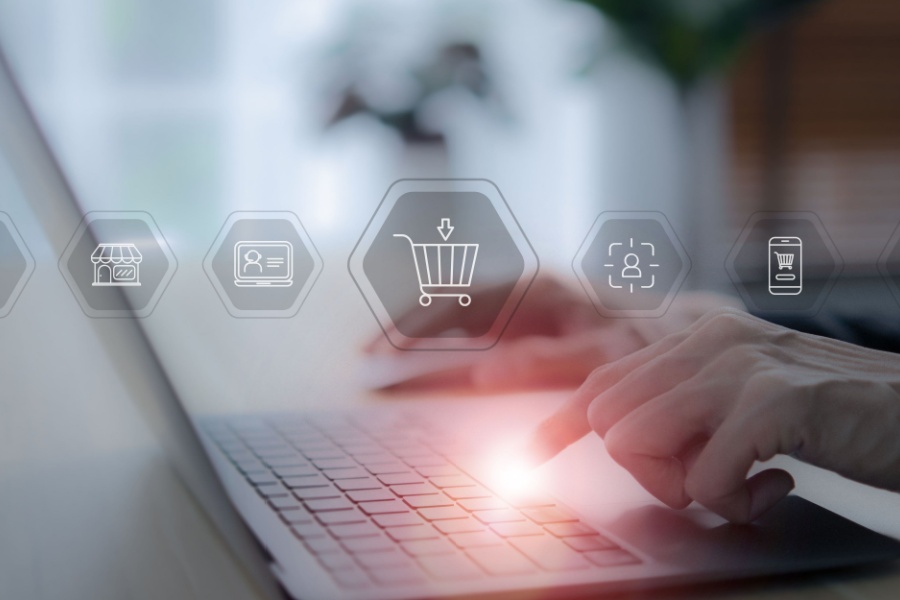Industries
Technology & Innovations
Semi Trucks
Logistics
Lease & Maintenance
Buy Used Trucks

Key Takeaways:
According to Forbes, more consumers are turning to the e-commerce experience and fewer are making the trip to physical locations, a shift that's expected to grow the global e-commerce market to $6.3 trillion in 2024.
Amidst this heightened digital competition, personalized interactions, branded order tracking, and seamless returns management come into play as strategies that retailers can use to cut through the noise.
Personalized interactions are key to creating customer connections in the digital space. By leveraging customer data and utilizing technologies like artificial intelligence (AI) and machine learning (ML), brands can gain deeper insights into individual consumer preferences, browsing behavior, and purchase history.
Retailers can use this information to create personalized recommendations, tailored marketing campaigns, and customized shopping experiences, as well as to seamlessly connect marketing to order fulfillment.
Understanding and anticipating customer needs enhances the shopping experience and makes customers feel valued and understood. That's why, in this article, we’ll explore the importance of providing exceptional customer service in the digital age, the role of technology, and innovation in supply chain optimization and fulfillment.
Personalizing customer interactions
It’s no secret that delighting customers involves personalizing retail interactions. Failure to personalize such interactions may funnel your prospects to your competition; correctly personalizing helps retain customers, boost your bottom line, and create positive customer experiences.
According to McKinsey, such positive experiences tend to yield 20% higher customer satisfaction rates, a 10% to 15% increase in sales conversion rates, and higher employee engagement rates.
Recent data also suggests that retail personalization is not just the expectation but also the standard. In one survey, more than 80% of customers said they spend more time with businesses that offer convenient ways to contact them, leading to higher retention rates and consumer spending. As a result, 77% of business leaders have seen positive ROI in immersive, personalized experiences.
Personalization and technology
Technology plays a pivotal role in personalizing the e-commerce experience; it's the only way to fulfill their expectations.
According to Forbes, 70% of customers expect businesses they interact with to have easy access to information such as past purchases and other important contextual nuances.
Additionally, 59% of customers expect companies to use the large amount of data they do have to provide truly personalized experiences, going above and beyond typical marketing efforts.
Retailers can use technology to fulfill customer expectations via:
However, personalization can only take you so far if your supply chain and fulfillment processes aren’t up to the task.
Optimizing the supply chain and fulfillment process
Technology and innovation can optimize the supply chain and fulfillment process to meet today's customers' evolving needs and expectations.
Branded order tracking provides transparent customer experiences. Customers anxiously await their purchases in today's digital landscape, especially in same-day and next-day delivery environments.
A transparent and well-designed tracking system can alleviate their concerns and build trust. By providing real-time updates on the status of customer orders, including estimated delivery times and shipment tracking links, brands can keep customers informed and engaged throughout the fulfillment process.
This level of transparency enhances the overall shopping experience. It also helps manage customer expectations and reduces the likelihood of negative post-purchase experiences.
Another important customer service aspect is seamless returns management. Easy and hassle-free returns have become a customer expectation, and retailers that provide seamless returns experiences can differentiate themselves from the competition.
By optimizing e-commerce returns processes, you can make it effortless for customers to initiate returns, track the progress of their return shipments, and receive timely refunds or exchanges. This fosters customer satisfaction and builds trust and loyalty, as customers know they can shop without worry and that the retailer stands behind its products.
Other ways technology plays a crucial role in optimizing supply chain and fulfillment include:
Overall, technology and innovation empower companies to optimize their supply chain and fulfillment processes, meeting the evolving expectations of discerning consumers. By embracing these advancements, businesses can ensure efficient operations, improved customer satisfaction, and a competitive edge in the market.
How’s your fulfillment process?
Shipping delays and erroneous orders are great ways to lose customers. Fulfillment, the entire process of receiving, packaging, and delivering orders to customers, is a critical part of your company’s success. Still, it's more complicated than it looks, especially when you ship globally.
Relying on 3PLs (third-party logistics companies) to handle your fulfillment takes the stress of inefficient and unreliable supply chain processes off your plate.
The RyderShip™ e-commerce technology platform ensures scalable, accurate, and efficient fulfillment, whether you're shipping 500 or 500,000 orders monthly. RyderShip™ streamlines vital fulfillment processes from the minute an order is placed until the minute it's shipped.
Discover how Ryder can make you Ever better™ with our supply chain and fulfillment process. Drop us a note or give us a call at 888-885-1958 to get started.